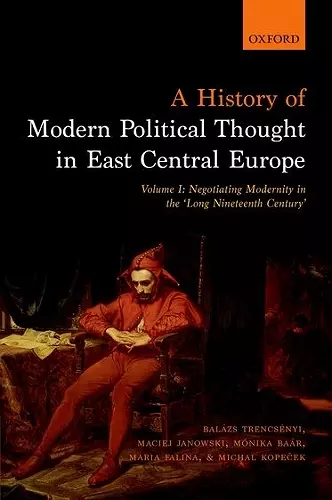A History of Modern Political Thought in East Central Europe
Volume I: Negotiating Modernity in the 'Long Nineteenth Century'
Balázs Trencsényi author Michal Kopecek author Maria Falina author Maciej Janowski author Monika Baar author
Format:Hardback
Publisher:Oxford University Press
Published:25th Feb '16
Currently unavailable, and unfortunately no date known when it will be back
This hardback is available in another edition too:
- Paperback£46.49(9780198803133)

A History of Modern Political Thought in East Central Europe is a two-volume project, authored by an international team of researchers, and offering the first-ever synthetic overview of the history of modern political thought in East Central Europe. Covering twenty national cultures and languages, the ensuing work goes beyond the conventional nation-centered narrative and offers a novel vision especially sensitive to the cross-cultural entanglement of discourses. Devising a regional perspective, the authors avoid projecting the Western European analytical and conceptual schemes on the whole continent, and develop instead new concepts, patterns of periodization and interpretative models. At the same time, they also reject the self-enclosing Eastern or Central European regionalist narratives and instead emphasize the multifarious dialogue of the region with the rest of the world. Along these lines, the two volumes are intended to make these cultures available for the global 'market of ideas' and also help rethinking some of the basic assumptions about the history of modern political thought, and modernity as such. The first volume deals with the period ranging from the Late Enlightenment to the First World War. It is structured along four broader chronological and thematic units: Enlightenment reformism, Romanticism and the national revivals, late nineteenth-century institutionalization of the national and state-building projects, and the new ideologies of the fin-de-siècle facing the rise of mass politics. Along these lines, the authors trace the continuities and ruptures of political discourses. They focus especially on the ways East Central European political thinkers sought to bridge the gap between the idealized Western type of modernity and their own societies challenged by overlapping national projects, social and cultural fragmentation, and the lack of institutional continuity.
This authoritative revision succeeds brilliantly thanks to the innovative and sophisticated approaches developed by its authors. Challenging traditional and recent conventions of intellectual history writing, they situate Eastern European political thought of the nineteenth century simultaneously in its local, regional, and transnational contexts. Rejecting tired nationalist teleologies, claims of an Eastern European Sonderweg, or binary structures that categorized political ideas as either local in origin or imported from an imagined West, the authors frame Eastern European political thought in fundamentally European terms, even as they elucidate its comparative local and regional dimensions. Pieter M. Judson, European University Institute This volume is the first comparative and transnational history of nineteenth-century political thought ever written about the broadly and challengingly defined region of East Central Europe that includes also relevant parts of the Balkans. Given the ethnic, cultural, and linguistic variety of the region, such work could only be accomplished as a team undertaking, which in this case has successfully overcome the usual sorting of national pigeon-holes next to each other. The book thus combines well-grounded local knowledge, paying due attention to the multilayered and multidirectional cultural transfers, while also being sensitive to the European social and political context. Miroslav Hroch, Charles University, Prague This impressive comparatist surveytwo centuries of political thought traced across a terrain of daunting political and linguistic complexitywill not only serve as a benchmark for future scholarship, but also as an inspiration. A shining example of what talented scholars can achieve through dedicated international cooperation, it restores a very important part of Europe to our understanding of European history. Joep Leerssen, University of Amsterdam
ISBN: 9780198737148
Dimensions: 240mm x 162mm x 42mm
Weight: 1240g
696 pages